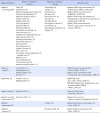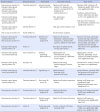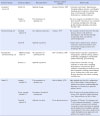Abstract
Purpose
The purpose of this study was to analyze the research trends of spiritual care in Korea and to make suggestions for future studies.
Results
Among the 209 studies reviewed. 74 were thesis studies and 135 for reported research in academic journal. There were 169 quantitative studies, 11 qualitative studies and 29 other types studies. The most frequently used study design was correlational. The majority of study participants were patients, followed by nursing students, nurses or non-medical participants. In the correlation studies, the variable of spiritual well-being had a positive correlation with hope, self-esteem and spiritual nursing care and a negative correlation with depression, anxiety and loneliness. In the experimental studies, the independent variables were spiritual nursing intervention, spiritual care education program and spiritual promoting intervention. The main theme of qualitative studies were the experience of spiritual care, spiritual experience and the most frequent designs were grounded theory, phenomenology and interpretative phenomenology.
Figures and Tables
Table 2
Research Designs according to Types of Research and Journal (N=209)

Exp=experimental research; Sur=Survey; Cor=Correlational research; GT=grounded theory; PM=phenomenology; IP=interpretative phenomenology; FGI=focus group interview; CA=concept analysis; RT=research trend; PD=program development; TD=tool development; MA=meta analysis; WCJ=world class journals; EDJ=excellent domestic journals.
References
1. Cha SJ. The relationship between spiritual health and fatigue in breast surgery patients undergoing adjuvant chemotherapy. Busan: Kosin University;2008. Unpublished master's thesis.
2. Dayson J, Cobb M, Forman D. The meaning of spirituality: Literature review. Journal of Advanced Nursing. 1997; 26:1183–1191.
3. Dossey BM, Keegan L, Guzzetta CE. Pocket guide for holistic nursing. american holistic nurse's association. Burlington: Jones and Bartlett Publishers, Inc;2005.
4. Ellison CW. Spiritual well-being: conceptualization and measurement. Journal of Psychology & Theology. 1983; 11:330–340.

5. Ferrel BR, Grant MM, Funk BM, Otis-Green SA, Garcia NJ. Quality of life in breast cancer survivors: Implications for developing support services. Oncology Nursing Forum. 1998; 25(3):887–895.
6. Fish S, Shelly JA. Spiritual care: The nurse's role. Illinois: Inter Varsity Press;1978.
8. Highfield MF. Spiritual health of oncology patients, nurse and patient perspectives. Cancer Nurs. 1992; 15:1–8.
9. Highfield ME. Providing spiritual care to patients with cancer. Clinical Journal of Oncology Nursing. 2000; 4(3):115–120.
10. Hunglemann J, Kenkel-Rossi E, Klassen L, Stollenwerk R. Spiritual well-being in older adults: Harmonious interconnectedness. Journal of Religion and Health. 1989; 24(3):407–418.
11. Jung JS. Analysis of nursing research about spiritual care. Jesus University Journal of Nursing. 2004; 2(1):7–20.
12. Jung JS. Effects of spiritual nursing care on spiritual well-being, depression, anxiety and pain in terminal patient with cancer. Gwangju: Chonnam National University;Unpublished doctoral dissertation.
13. Kim KO. A survey about the meaning of life and spiritual distress in diabetes patient. Seoul: Korea University;1990. Unpublished master's thesis.
14. Kim UJ. A study of spiritual interaction and recovery of health status of inpatient. Seoul: Yonsei University;1984. Unpublished master's thesis.
15. Kim ES, Kim GS, Kim DR, Kim EJ, Sung KM, Shin HK, et al. Trends of nursing science inquiry in doctoral dissertations. Journal of Korean Academy Nursing. 2004; 34(2):315–323.

16. Kim YH, Choi GJ, Kim SD. An analytic study on the trends of spirituality in Korea. The Korea Journal of Counseling. 2009; 10(2):813–829.
17. Lee GY, Kim JH, Kim DW. Development of the spirituality scale. Korean Journal of Counseling and Psychotherapy. 2003; 15(4):711–728.
18. Lee YH. A study of the correlation between spiritual wellbeing and spiritual nursing care of nurses. Gongju: Kongju National University;2006. Unpublished master's thesis.
19. Neuman B. The process of psychotherapy: A journey of discovery. Journal of Advanced Nursing. 2003; 43(1):109–109.

20. Nowotny ML. As assessment of hope in patients with cancer: Development of an instrument. Oncology Nursing Forum. 1989; 16(1):57–61.
21. O'Brien ME. Spirituality in Nursing: Standing on Holy Ground. 3rd ed.Burlington: Jones And Bartlett Publishers, Inc;2008.
22. Paloutzian RF, Ellison CW. Loneliness, spiritual wellbeing & the quality of life. In : Peplau LA, Perman D, editors. Loneliness: A source-book of current theory research & therapy. New York: John Wiley & Sones Inc;1982. p. 224–236.
23. Ross LA. Spiritual care in nursing: An overview of the research to date. Journal of Clinical Nursing. 2006; 15(7):852–862.

24. Taylor EJ, Amenta M, Highfield M. Spiritual care practices of oncology nurses. Oncology Nursing Forum. 1995; 22(1):31–39.
25. WHOQOL Group. The world health organization quality of life assessment (WHOQOL): development and general psychometric properties. Social Science and Medicine. 1993; 46:1585–1596.
26. Wilkinson JM.
JJ Kim
YS Kim
JW Park
JH Park
SH Yang
. Nursing process and critical thinking. Seoul: Hyunmoon-Sa;2008. Original work published 2008.
27. Yong JS, Kim JH, Han SS, Puchalski CM. Development and validation of a scale assessing spiritual needs for korean patients with cancer. Journal of Palliative Care. 2008; 24(4):240–246.

28. Yoo DS. The spirituality, religion, thought and of Korean. Academy of Social Science. 1990; 5:129–162.
29. Yoon MO. The spiritual well-being and the spiritual nursing care of nurses for cancer patients. The Korean Journal of Hospice and Palliative Care. 2009; 12(2):72–79.

30. You HS, So HS, Kim HS. Analysis of nursing researches about organ donation and transplantation. Korean Journal of Adult Nursing. 2008; 20(6):895–904.




 PDF
PDF ePub
ePub Citation
Citation Print
Print






 XML Download
XML Download